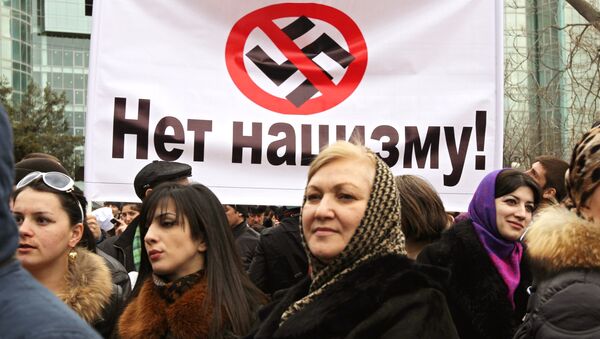MOSCOW, November 9 (RIA Novosti) —The International Day Against Fascism and Antisemitism is marked on November 9 to commemorate the victims of Nazism and nationalist, racist and antisemitic terror.
It is celebrated in many countries on the initiative of the European Network against Nationalism, Racism, Fascism and in Support of Migrants and Refugees (UNITED), which unites over 560 organizations in Europe and acts independently of political parties and governments.
On November 9, 1938, a series of Jewish pogroms, called Kristallnacht, was organized and carried out by the Nazis. Kristallnacht pogroms became the Third Reich's first act of mass violence against Jews. On that day, the Nazis killed over 90 people, and according to other sources, up to 2,000 people. Between 3,500 and 30,000 Jews were seized and sent to concentration camps. From 300 to 1,500 synagogues were set on fire, while thousands of Jewish shops had their windows smashed, which gave rise to the name "Kristallnacht" or "Crystal Night."
Historians believe that the lack of attention to the pogroms both in Germany itself and in other European countries untied the Nazis' hands and triggered the mass extermination of European Jews. Kristallnacht became a turning point in the fate of German and Austrian Jews. It led to one of the most hideous crimes by the Nazi regime, the Holocaust, which claimed lives of 6 million people.
Fascism was defeated by joint efforts of many countries in 1945, bringing sorrow and millions of victims. The peoples of all countries, primarily those who had suffered the most, hoped that not only the fascist military armada was defeated but also the fascist ideology.
The ideology supposed the hatred for people, who were different, and called for killing according to religion, ethnicity, skin color and sex orientation.
The globalization of the world economy, the migration, mostly to Western Europe and the United States, of millions of people, the spread of extremist and religious views and the rise of international terrorism resulted in xenophobia, which even the most developed states were unable to avoid.
Nationalist tendencies are often rooted in the ideology of the past. As a result, at the beginning of the 21st century, the manifestations of fascism, including xenophobia, nationalism, antisemitism and racism, have increased in various parts of the world.
Neo-Nazi sentiments have also grown in Russia, in a country that played a key role in achieving victory over fascism and lost millions of its citizens in the war.
According to the Sova information and analysis center, in 2012, 19 people were killed and 191 injured as a result of racist and neo-Nazi violence, while in 2013, 21 people were killed and 178 injured.
In the first six months of 2014, at least 74 people suffered as a result of xenophobic and neo-Nazi violence, including 13 killed.
On May 5, 2014, Russian President Vladimir Putin signed a law to enhance the efforts to counter Nazism, extremism, fascism, and other actions insulting the memory of millions of people killed during the Great Patriotic War of the Soviet Union of 1941-45. It instituted punishment of up to five years in prison for the propaganda of Nazism and the spread of false information about the activities of the USSR during World War II.
On November 4, 2014, Vladimir Putin signed a law introducing amendments to the law on the Commemoration of the Soviet People's Victory in the Great Patriotic War.
These amendments expanded the number of organizations that will carry administrative responsibilities for demonstration and propaganda of fascist attributes and symbols in public. The list of these organizations was enlarged with organizations that collaborated with fascist international organizations that deny the verdict of the Nuremberg Tribunal or the verdicts delivered during the Great Patriotic War and World War II.
Since 1992, the UNITED has marked the International Day Against Fascism and Antisemitism in order to commemorate those killed during Kristallnacht, as well as all the victims of fascism. The International Day is also aimed at putting an end to hatred and informing people about the danger of nationalism, populism, antisemitism, ultra-right extremism and neo-fascism today.



